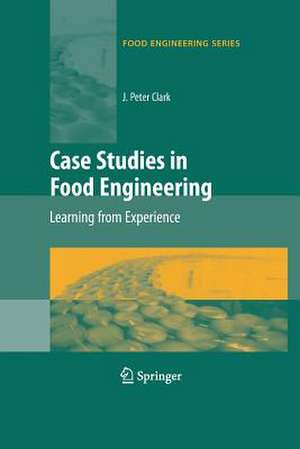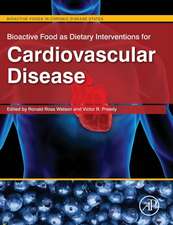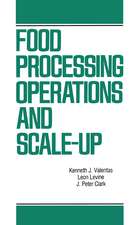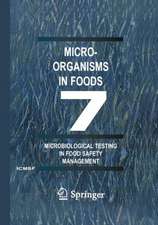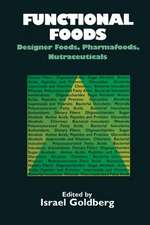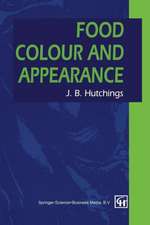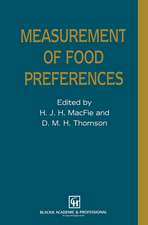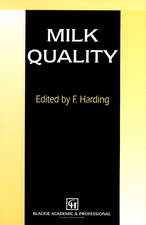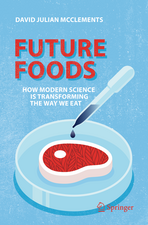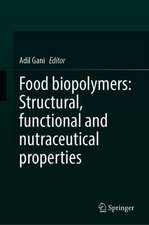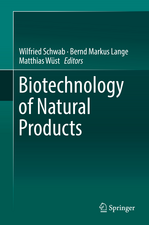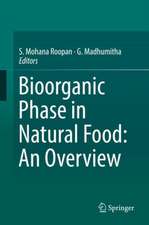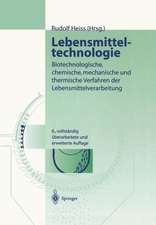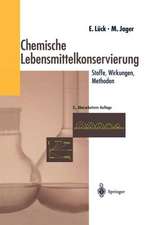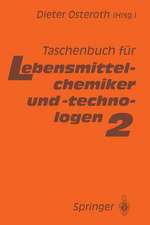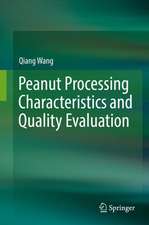Case Studies in Food Engineering: Learning from Experience: Food Engineering Series
Autor J. Peter Clarken Limba Engleză Paperback – 30 oct 2014
This book has several purposes: (1) to serve as a source of information about a representative collection of food processes with which Clark has had experience; (2) to convey some practical lessons about process development and plant design; and (3) to serve educators as a resource for class problems and discussion.
The book is organized in three broad sections. The first concerns processes that are primarily physical, such as mixing. The second concerns processes that also involve biochemical changes, such as thermal sterilization. The third section addresses some broader issues that have not been discussed elsewhere, including how to tour a plant, how to choose among building a new plant, expanding or renovating; and how to develop processes.
| Toate formatele și edițiile | Preț | Express |
|---|---|---|
| Paperback (1) | 384.86 lei 6-8 săpt. | |
| Springer – 30 oct 2014 | 384.86 lei 6-8 săpt. | |
| Hardback (1) | 391.61 lei 6-8 săpt. | |
| Springer – 25 iun 2009 | 391.61 lei 6-8 săpt. |
Din seria Food Engineering Series
- 18%
 Preț: 980.95 lei
Preț: 980.95 lei - 15%
 Preț: 642.51 lei
Preț: 642.51 lei - 15%
 Preț: 647.92 lei
Preț: 647.92 lei - 23%
 Preț: 856.68 lei
Preț: 856.68 lei - 15%
 Preț: 647.40 lei
Preț: 647.40 lei - 15%
 Preț: 646.30 lei
Preț: 646.30 lei - 18%
 Preț: 966.78 lei
Preț: 966.78 lei - 18%
 Preț: 1236.38 lei
Preț: 1236.38 lei - 15%
 Preț: 656.74 lei
Preț: 656.74 lei - 15%
 Preț: 653.33 lei
Preț: 653.33 lei - 18%
 Preț: 951.59 lei
Preț: 951.59 lei - 18%
 Preț: 944.99 lei
Preț: 944.99 lei - 15%
 Preț: 716.15 lei
Preț: 716.15 lei - 18%
 Preț: 1232.57 lei
Preț: 1232.57 lei - 15%
 Preț: 647.92 lei
Preț: 647.92 lei - 15%
 Preț: 587.85 lei
Preț: 587.85 lei - 18%
 Preț: 1222.80 lei
Preț: 1222.80 lei - 18%
 Preț: 952.09 lei
Preț: 952.09 lei - 18%
 Preț: 1398.31 lei
Preț: 1398.31 lei -
 Preț: 399.12 lei
Preț: 399.12 lei - 18%
 Preț: 954.14 lei
Preț: 954.14 lei - 15%
 Preț: 644.95 lei
Preț: 644.95 lei - 18%
 Preț: 968.65 lei
Preț: 968.65 lei - 15%
 Preț: 638.89 lei
Preț: 638.89 lei - 18%
 Preț: 962.49 lei
Preț: 962.49 lei - 18%
 Preț: 1013.65 lei
Preț: 1013.65 lei - 18%
 Preț: 1225.79 lei
Preț: 1225.79 lei - 18%
 Preț: 961.41 lei
Preț: 961.41 lei - 18%
 Preț: 1384.26 lei
Preț: 1384.26 lei - 18%
 Preț: 961.72 lei
Preț: 961.72 lei -
 Preț: 489.30 lei
Preț: 489.30 lei - 18%
 Preț: 1388.05 lei
Preț: 1388.05 lei - 18%
 Preț: 1235.08 lei
Preț: 1235.08 lei - 15%
 Preț: 643.34 lei
Preț: 643.34 lei - 18%
 Preț: 2109.71 lei
Preț: 2109.71 lei - 18%
 Preț: 1815.87 lei
Preț: 1815.87 lei - 15%
 Preț: 644.95 lei
Preț: 644.95 lei - 18%
 Preț: 957.32 lei
Preț: 957.32 lei - 18%
 Preț: 973.06 lei
Preț: 973.06 lei
Preț: 384.86 lei
Nou
Puncte Express: 577
Preț estimativ în valută:
73.68€ • 76.88$ • 61.76£
73.68€ • 76.88$ • 61.76£
Carte tipărită la comandă
Livrare economică 13-27 martie
Preluare comenzi: 021 569.72.76
Specificații
ISBN-13: 9781489984241
ISBN-10: 1489984240
Pagini: 240
Ilustrații: XIII, 224 p.
Dimensiuni: 155 x 235 x 13 mm
Greutate: 0.34 kg
Ediția:2009
Editura: Springer
Colecția Springer
Seria Food Engineering Series
Locul publicării:New York, NY, United States
ISBN-10: 1489984240
Pagini: 240
Ilustrații: XIII, 224 p.
Dimensiuni: 155 x 235 x 13 mm
Greutate: 0.34 kg
Ediția:2009
Editura: Springer
Colecția Springer
Seria Food Engineering Series
Locul publicării:New York, NY, United States
Public țintă
ResearchCuprins
Section 1: Processes Based Largely on Physical Operations.- Dry Mixing.- Snacks and Baking.- Breakfast Cereals.- Pet Foods.- Fruit and Vegetable Juice Processing.- Membrane Processing.- Freeze Drying.- Section 2: Processes Based on Biochemical Reactions and Thermal Treatment.- Continuous Thermal Processing.- Retort Pouch Foods.- Ice Cream.- Sausages and Other Meat Products.- Non-thermal Processing.- Section 3: A few broader topics.- Economic Evaluation.- Design of a New Facility.- How to Tour a Food Plant.- Build New, Expand, or Upgrade?.- Developing Processes.
Recenzii
From the reviews:“Clark … has more than 40 years of experience in the field; this is evidenced by the significant practical engineering knowledge that he imparts in this book. The work describes thermal sterilization and nonthermal sterilization processes in detail. … A good list of references, a glossary, and many examples are included. This book will be useful to professionals and can serve as … a good textbook on food engineering. Summing Up: Recommended. Upper-division undergraduates through professionals; two-year technical programming students.” (L. E. Erickson, Choice, Vol. 47 (4), December, 2009)
Textul de pe ultima copertă
One of the best ways for students or practitioners to learn is through real-life example. In this volume, Clark presents several case studies that can be used not only by those currently working in the industry, but as a means for sparking discussion in food engineering classes.
This book has several purposes: 1) to serve as a source of information about a representative collection of food processes with which Clark has had experience; 2) to convey some practical lessons about process development and plant design; and 3) to serve educators as a resource for class problems and discussion.
The book is organized in three broad sections. The first concerns processes that are primarily physical, such as mixing. The second concerns processes that also involve biochemical changes, such as thermal sterilization. The third section addresses some broader issues that have not been discussed elsewhere, including how to tour a plant, how to choose among building a new plant, expanding or renovating; and how to develop processes.
J Peter Clark is a Consultant to the Process Industries, residing in Oak Park, Illinois.
This book has several purposes: 1) to serve as a source of information about a representative collection of food processes with which Clark has had experience; 2) to convey some practical lessons about process development and plant design; and 3) to serve educators as a resource for class problems and discussion.
The book is organized in three broad sections. The first concerns processes that are primarily physical, such as mixing. The second concerns processes that also involve biochemical changes, such as thermal sterilization. The third section addresses some broader issues that have not been discussed elsewhere, including how to tour a plant, how to choose among building a new plant, expanding or renovating; and how to develop processes.
J Peter Clark is a Consultant to the Process Industries, residing in Oak Park, Illinois.
Caracteristici
Serves as a source of information about a representative collection of food processes Conveys some practical lessons about process development and plant design Serves educators as a resource for class problems and discussion Includes supplementary material: sn.pub/extras
